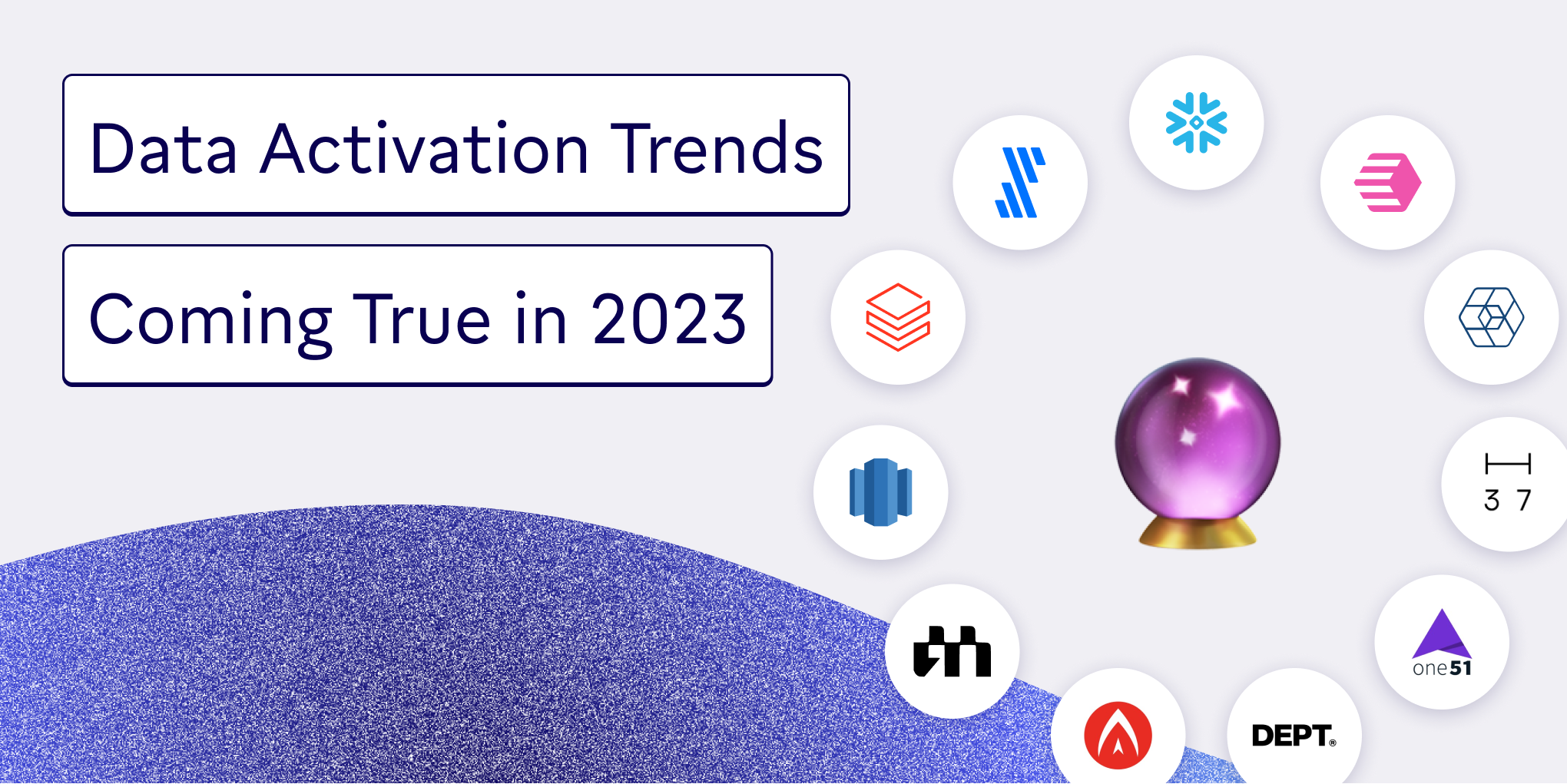Two months into 2023, it’s clear that Data Activation is here to stay. Data Activation, the concept of unlocking customer insights in the warehouse and making them actionable, is the key to staying ahead of the competition and driving customer engagement.
Marketers have always craved more data for better personalization, but the use of the data warehouse in marketing is still a relatively new phenomenon. Now, the data warehouse (or data lake) is emerging as the single source of truth for marketing teams to do their job better and faster with customer data.
In this blog, we’ve collected 12 Data Activation Trends from modern data thought leaders. We'll explore what these shifts mean for the future of marketing, and how warehouse-first marketing can help companies achieve their goals in 2023 and beyond. 🔮
Top 4 takeaways
These are the common themes across the experts we surveyed:
- A centralized data stack makes the Customer 360 dream a reality
- The future of the data warehouse lies in activation, not data collection
- Marketers need to collaborate closely with data teams to be effective
- Data activation helps marketers deliver more value, faster
A centralized data stack makes the Customer 360 dream a reality
The data warehouse (or data lake) has triumphed as the source of truth for customer data. Previous martech solutions like Customer Data Platforms (CDPs) haven't delivered on the promise of unifying data across the organization.
Only the warehouse has complete customer and company-level information to be a source of truth for analytics and activation.
"The ultimate marketing dream of a customer 360 becomes a reality with the power of data and a data warehouse. Data and marketing teams work in unison to uncover insights, optimize processes, and transform from growth at all costs to cost effective powerhouses, all while realizing the full potential of marketing efforts."

Amit Kapadia
Sr Solutions Product Marketer @ Fivetran
"We predict that modern marketers will prioritize building a robust Customer 360 in the Data Cloud and leverage it as the single source of truth to operate as the backbone of their marketing stacks. 2023 will coronate marketers who benefit from adopt a centralized marketing data stack, without sacrificing the flexibility to choose the best tools for their specific marketing needs."
“Marketers need access to all kinds of data to build a full picture of the customer. Machine learning models, like propensity to buy and recommendation engines, make marketing even more targeted and powerful than before. Combining streaming event data, CRM & support data, and machine learning outputs in one central place makes a Lakehouse the ideal foundation for data activation.”

Roger Murff
VP Partnerships @ Databricks
"Today customers are expecting consistent if not personalised experiences. In order to offer such experience, brands need to create customer 360° views, aggregating and structuring all interactions (across the entire customer journey) customers are having with brands. From a technological standpoint, data warehouses allow you to create that single source of truth and enable audience activation across all communication channels."

Julien De Visscher
Co-Founder @ Human37
The future of the data warehouse lies in activation, not data collection
Data collection is no longer the problem (in fact, we’re drowning in more data than ever before). Rather, it’s shifted to: How do we actually access and activate that data? 🤔
Most growing companies are already investing heavily in warehouses to power analytics and reporting. Now, instead of just being repositories for historical data, warehouses can become a hub to operationalize customer insights. True self-service and data democratization comes from making data actionable for business outcomes.
"The future of the data warehouse lies in data activation, fueling use cases beyond traditional reporting and empowering individuals with the information they need, when and where they need it. True self-service goes beyond just providing data and dashboards, it is about making data accessible and actionable for business success. In these uncertain economic times, it’s more important than ever for data to demonstrate its added value through targeted and effective use cases."

Moritz Dressel
Team Lead Data Consulting @ DEPT
"The era of all-in-one, out-of-the-box platforms is over. The rise of the modern data stack has made the data warehouse a hub to operationalize data, not just to collect and store it. Data Activation means that companies can choose best-in-class tools to build a marketing platform with user-friendliness of a CDP, combined with the power of modern cloud compute."

David Gillespie
Strategic Partnerships @ AWS
"In 2023, Data Warehouses will realize their full potential, once again, by enabling marketing teams to target and interact with their customers accurately. In addition, Data Warehouses and Data Lakes in the cloud and their unlimited resource capacity will allow companies to continuously store and process more data to enhance their customer profiles. Opportunities are available for everyone, but success is equivalent to the level of consolidated and high-quality data."

Julio Acuna
Co-founder @ One51
"Data is going to increasingly become a competitive advantage for companies, but there is a massive gap between business tools and that underlying customer data. 2023 is the year where companies will look to harness this data by using their warehouses as the single source of truth for intelligent segmentation and highly personalized outreach."

Sharrifah Lorenz
Head of Partnerships @ Census
Marketers need to collaborate closely with data teams to be effective
Data and marketing teams need to collaborate more than ever to make their valuable customer data work for them. One success story comes from design platform Canva, who embeds data analysts in the Lifecycle Marketing team to achieve marketing goals. Data folks work with marketers to measure the effectiveness of their campaigns, improve targeting, and experiment with audiences.
👉 Listen to Canva’s story here
"Activating first-party customer behavioral data is the #1 differentiator empowering Marketers to lower CAC, drive campaign ROAS and deliver personalized experiences. Organizations who can successfully foster collaboration between Marketing and Data teams with a warehouse-centric strategy for activating first-party data assets and audiences at scale, will continue to outperform their peers."

Mike Maloney
Field Chief Data Officer @ Snowplow
"In the near future, access to real-time, unified, and actionable insights will transform marketing workflows and enable data-driven decision making. The collaboration between data and marketing teams will lead to the delivery of more personalized and relevant customer experiences."

Hassan Al Rabea
Lead Consultant (Data and Analytics Engineering) @ Montreal Analytics
Data activation helps marketers deliver more value, faster
Data activation is the missing link that bridges the gap between marketing teams and data teams. Warehouse-native marketing tools enable marketers to unlock data directly from the warehouse, while leveraging the data collection and transformation efforts of the data team.
However, it’s important to remember the ultimate goal. The purpose of collecting data is to build better customer experiences. In the end, all these advancements in data activation empower more creative and personalized marketing, so businesses can provide more value to their customers.
"We’ve seen repeat success when deploying Data Warehouse Customer 360 projects and Braze (CRM) projects in parallel. In 2023, we believe businesses will no longer be able to capture data without delivering immediate value in return. For example: if you’re tracking using browsing behaviour, you should be delivering more relevant communications across channels (email, push, sms, in-app). If you’re tracking purchase behaviour, this should inform the next offer you’re recommending."

Thierry Sequeira
CEO @ Massive Rocket
"As we see more and more use of high quality Reverse ETL tools, this will definitely impact the way data and marketing teams work together. Marketing has become a very tool-heavy industry; one team for social platforms, one team for email, one team for internal marketing, etc. Via a well implemented use of reverse ETL tools, we can start to automate some of these processes in one central place based on data triggers as opposed to human intervention. This leaves marketers with more capacity to run with new ideas and optimize existing flows."

Callie White
Sr. Analytics Consultant @ Montreal Analytics
Conclusion
Thank you to all the leaders, partners, and practitioners who contributed to this roundup! 2023 is sure to bring more changes to the way companies collect, analyze, and activate data for marketing. At Census we're super excited for what's ahead, and we look forward to helping everyone do more with their data 🚀




















